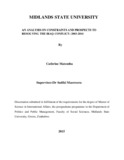Please use this identifier to cite or link to this item:
https://cris.library.msu.ac.zw//handle/11408/2641Full metadata record
| DC Field | Value | Language |
|---|---|---|
| dc.contributor.author | Matemba, Cathrine | - |
| dc.date.accessioned | 2017-07-12T13:07:28Z | - |
| dc.date.available | 2017-07-12T13:07:28Z | - |
| dc.date.issued | 2015 | - |
| dc.identifier.uri | http://hdl.handle.net/11408/2641 | - |
| dc.description.abstract | The study is grounded under the premise that the 2003 to 2014 Iraq conflict is a combination of intricate myriad internal and external factors that present a challenge to resolving the conflict. The Iraq conflict is characterized by a web of interconnected and complex events that present a formidable ostensible challenge to its resolution. In light of these challenges, questions have been posed on whether; the conflict is a result of internal problems or external factors? If so, what role have these factors played in the escalation of the Iraq conflict? What then is the role of state and non-state actors in the context of the challenges encountered in resolving the conflict? What should the international community do to encourage and facilitate dialogue? It is in this attempt to explain the challenges and likelihood of resolving the 2003-2014 Iraq crisis that serves as the basis for this study. In trying to address the key questions which have formed the basis of the research, the study employs qualitative approaches in collecting and analyzing data. In this regard, data were collected and analyzed from primary and secondary sources as well as interviews and questionnaires. The findings would not only be evaluated within the core objective of critically analyzing the constraints and prospects to resolving the 2003-2014 Iraq conflict but rather extend to critically evaluate the respective roles of state and non-state actors in the context of challenges encountered in resolving the conflict. Lastly the study seeks to recommend scholarly and policy suggestions in on the prospects of finding a sustainable solution to the 2003-2014 Iraq conflict. Using Lederach’s theory on conflict transformation as a theoretical tool for analysis, the study noted that there is need to go beyond the immediate issues surrounding the Iraq conflict by bringing the overall mean¬ing of the conflict into sharper focus. In light of that, the study recognizes that the various dynamics constituting the conflict have got various underpinnings which have thus contributed to the escalation of the Iraq conflict. The study generally established that the Iraq conflict is a myriad multidimensional crisis characterized by a plethora of actors operating in different arenas at the national, regional and international level. The presence of a multiplicity of actors presents formidable challenges to the resolution of the conflict as these actors have expressed divergent parallel interests which tend to conflict with each other as well as undermine efforts of resolving the conflict. Moreover state and non-state actors have been motivated primarily by their national interests to intervene in the Iraq conflict. Seemingly, these national interests have tended to conflict with one another thereby making it difficult to come up with concerted efforts to resolve the Iraq crisis. Having noted that the major findings of the study revolve around internal and external issues, the study came up with a number of recommendations. The recommendations shall be proffered in at a domestic, regional and international level. • Firstly the need for a reformation of political, economic , social and security structures within Iraq • Secondly, the need for regional concerted effort to end the war in Syria • Finally the need for a more vigorous approach by the UN and Arab League in mediating towards a peaceful resolution to the Iraq conflict | en_US |
| dc.language.iso | en | en_US |
| dc.publisher | Midlands State University | en_US |
| dc.subject | Conflict | en_US |
| dc.subject | Iraq | en_US |
| dc.title | An analysis on constraints and prospects to resolving the Iraq conflict: 2003-2014 | en_US |
| item.languageiso639-1 | en | - |
| item.grantfulltext | open | - |
| item.fulltext | With Fulltext | - |
| Appears in Collections: | Master of Science in International Affairs Degree | |
Files in This Item:
| File | Description | Size | Format | |
|---|---|---|---|---|
| C.Matemba msia 800 complete.pdf | Full Text | 1.73 MB | Adobe PDF |  View/Open |
Page view(s)
100
checked on Apr 11, 2025
Download(s)
520
checked on Apr 11, 2025
Google ScholarTM
Check
Items in MSUIR are protected by copyright, with all rights reserved, unless otherwise indicated.



